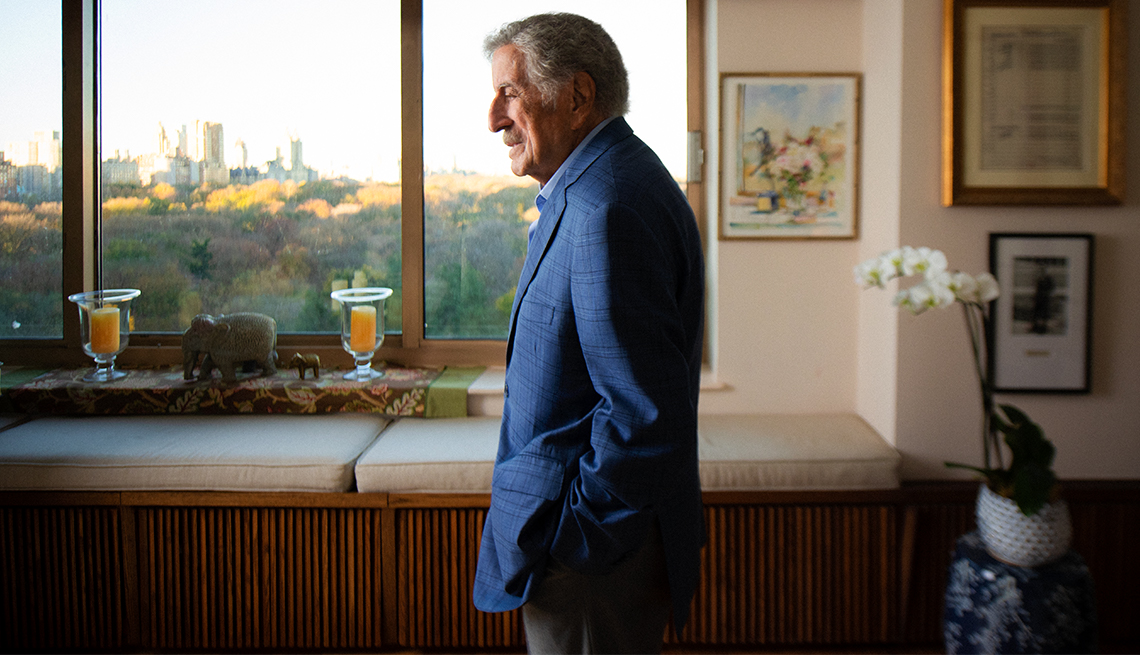
Neuroscience even today cannot explain how a man whose speaking voice has become so hesitant — whose memory of events, people and places has largely vanished — can, at the sound of a musical cue, lift his voice in song with such beauty and expression, except to say that music and singing emerge, as Levitin has pointed out, from areas of the brain quite distinct from those associated with speech and language. The powerful feelings released by music can connect listeners to their deep emotional memories, even those inaccessible to the conscious mind.
And so it went, for the next hour, a miraculous concert that was, quite literally, a gift for an observer and a stroll down memory lane.
"How about the Duke Ellington tune?” Musiker said — and right away, Tony's voice floated toward the ceiling like notes from a lovely muted trumpet.
"In my solitude,” he sang, “You haunt me/ With dreadful ease/ Of days gone by./ In my solitude/ You taunt me/ With memories/ That never die."
On “Boulevard of Broken Dreams,” the first single he cut for Columbia, in 1950, Tony, at 23 years old, had ended the song with a full bel canto window-rattler — and astonishingly he reproduced it now: “… and dance along the boulevaaaaaahd of brooooooken dreams!” On “Fly Me to the Moon,” he lofted his voice gently into the air just as he had done in his gorgeous 1965 recording, and on the up-tempo “The Lady's in Love With You,” he nimbly moved through the intricate lyrics as if scatting. He ended his rendition of “Smile” ("… though your heart is breaking …") with a long-drawn “smiiiiiiiiiiile” that made Susan use an expression that Tony liked to say when he nailed the definitive version of a song: “Right in there,” she said. Musiker shook his head in amazement, looked at Tony and thumped his fist against his heart.
"This is it,” he said to Tony. “The heart."
"Every time,” Tony said — his first spontaneous verbal reaction of the afternoon. As the rehearsal went on, he increasingly traded short conversational back-and-forths with Musiker. At the end of a rousing “When You're Smiling,” Musiker jokily alluded to their audience of three people as 3 million people. “Actually,” he added, “you once said that if even one person — remember you said this years ago?"
"Oh, yeah,” Tony said.
"If there's one person in the club,” Musiker said.
"Then you really give it to him,” Tony said. “It's really intimate that way.”
Later, when I spoke with Musiker about what makes Tony special, he said, “Proper vocal training and a musician's innate sense, not a singer's innate sense. Like an instrumentalist, he hears it all. Constantly knocks me out. Then the complete honesty and love.”
The often-miraculous way music can reconnect dementia patients to family and friends, memory and the past, is, alas, temporary. Lucidity, memory, conversation may linger for a few minutes. But for those who yearn for the old connection, who desperately miss the spark of animation in a loved one, even these brief glimpses of the person they knew, these fleeting connections, arrive like a blessing. For Susan, the obvious pleasure that Tony takes in singing is a precious gift. “I wish he kept up his painting, but that hasn't latched in like the singing has.” The charcoal landscape on his easel, she said, was a rarity. But not the singing. Not yet. “Singing is everything to him,” Susan told me, as I was packing up to leave. “Everything. It has saved his life many times. Many times. Through divorces and things. If he ever stops singing, that's when we'll know …” Her voice catching, she stopped.
Two days earlier, the actor Sean Connery had died, at age 90, of dementia. Connery's widow said that in his final months he had been unable to communicate, but that he, thankfully, had slipped away quietly in his sleep. “I'm hoping for that with Tony,” Susan told me. “Hopefully he'll just go to sleep one night and that will be that. I'm hoping and praying that he won't take a turn for the worse that's really crazy bad.” She fell silent for a moment. Then she smiled. “There's a lot about him that I miss,” she said. “Because he's not the old Tony anymore.” Again, her voice caught and she looked down. Then she mastered herself, looked up at me and smiled. “But when he sings, he's the old Tony."
Article From & Read More ( Tony Bennett's Battle With Alzheimer's Disease - AARP )https://ift.tt/3r9zZ25
Bagikan Berita Ini














0 Response to "Tony Bennett's Battle With Alzheimer's Disease - AARP"
Post a Comment